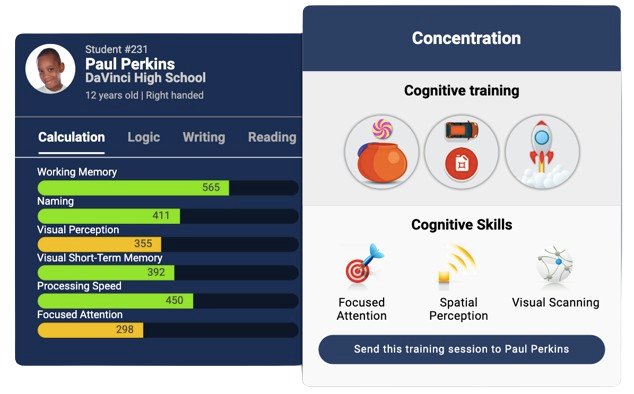
Invisible Difficulties: Identifying and Addressing Developmental Challenges in the Classroom
Every classroom is a vibrant mosaic of unique minds, each brimming with potential. However, some students may face hidden developmental challenges that can impede their progress. Recognizing these issues early on is essential for ensuring that every child has the opportunity to thrive. By understanding the signs and implementing effective strategies, teachers can make a profound difference in their students’ lives.

The Power of Early Detection
In a busy classroom, it can be easy to overlook the subtle signs of cognitive difficulties. However, early detection of these challenges is key to providing timely support. Students who struggle with attention, memory, or executive functions may exhibit behaviors that are often misunderstood as a lack of effort or motivation. Recognizing these signs early allows educators to intervene before these difficulties escalate into significant academic or social barriers.
Identifying developmental challenges is not just about academic success; it’s about fostering a supportive environment where all students can build confidence and resilience. Early intervention can prevent small issues from becoming major obstacles, helping students stay on track and feel more empowered in their learning journey.
Recognizing the Signs: What to Look For
Educators play a critical role in spotting potential developmental problems. Here are some key indicators to watch for:
- Inconsistent Academic Performance: A student excelling in one subject but struggling in another might be dealing with specific cognitive challenges rather than a lack of understanding of the material.
- Difficulty Following Instructions: If a student frequently struggles with multi-step tasks or seems to need instructions repeated, it could signal issues with working memory or attention.
- Disorganization: Students who consistently have trouble keeping their work and materials organized may be facing difficulties with executive function.
- Social and Behavioral Challenges: Cognitive difficulties often manifest in social settings. A student who seems withdrawn, frustrated, or has trouble connecting with peers might be struggling with underlying cognitive issues.
These signs are crucial clues that something more may be going on beneath the surface. But once these potential issues are identified, how can educators effectively address them?
Meet CogniFit: Your Tool for Tackling Developmental Challenges
This is where CogniFit comes into play, offering educators a powerful tool to assess and enhance their students’ cognitive abilities. CogniFit is a cutting-edge platform designed to help teachers detect and address developmental challenges with precision and ease.
CogniFit provides a range of cognitive assessments that cover essential areas such as memory, attention, reasoning, and coordination. These assessments are designed to be both comprehensive and user-friendly, making it simple for teachers to gain a deep understanding of each student’s cognitive profile. The results from these assessments offer valuable insights into where a student might need additional support, enabling teachers to tailor their instructional strategies accordingly.

But CogniFit doesn’t stop at assessment. The brain based learning education platform from CogniFit offers personalized brain training programs that are specifically designed to target the areas where students need the most improvement. These programs are based on the latest research in neuropsychology and are presented in an engaging, interactive format that students find both fun and motivating. This makes the process of cognitive development not only effective but also enjoyable for students.
CogniFit is a cognitive training platform widely used in educational settings. Here are the top 5 benefits of the CogniFit platform for schools:
- Cognitive Skill Development: CogniFit offers a range of games and exercises that are designed to improve various cognitive skills such as memory, attention, reasoning, and problem-solving. These skills are crucial for academic success, and the platform tailors exercises to the needs of individual students.
- Personalized Learning: The platform provides personalized cognitive training programs based on each student’s cognitive profile. This individualized approach allows teachers to address the specific needs of students, helping to close learning gaps and enhance overall academic performance.
- Progress Tracking and Analytics: CogniFit includes comprehensive analytics and reporting tools that allow educators to track students’ progress over time. Teachers can monitor which cognitive skills are improving, identify areas that need more attention, and adjust educational strategies accordingly.
- Accessibility and Inclusivity: The platform is designed to be accessible for students with a wide range of abilities, including those with learning disabilities or other special educational needs. This inclusivity helps ensure that all students can benefit from cognitive training, regardless of their starting point.
- Engagement and Motivation: CogniFit uses gamification to make cognitive training enjoyable and engaging for students. The interactive and game-like nature of the exercises motivates students to participate regularly, which leads to better adherence to cognitive training and, ultimately, improved cognitive skills.
Transforming the Educational Experience
Incorporating tools like CogniFit into the classroom represents a significant step forward in personalized education. By understanding and addressing each student’s cognitive strengths and weaknesses, educators can create a learning environment that is more inclusive and effective.
The data-driven insights provided by CogniFit allow teachers to make informed decisions that can transform their classroom dynamics. For example, if a large portion of the class struggles with focused attention, a teacher might introduce more interactive activities to keep students engaged. This approach not only helps students with identified challenges but also enriches the learning experience for all students.
Paving the Way: The Path Forward in Educational Excellence
Detecting developmental challenges in the classroom is a critical component of modern education. With innovative tools like CogniFit, educators are better equipped than ever to identify and address cognitive difficulties early, ensuring that every student has the opportunity to succeed. By embracing these advancements, teachers can turn potential obstacles into opportunities for growth, helping students to reach their full potential and flourish in their academic journey.
In conclusion, the integration of CogniFit into educational practices offers a comprehensive solution to the challenges of detecting and addressing developmental problems. It empowers teachers to provide targeted support that can make a lasting impact on their students’ academic and personal success.
Disclaimer: CogniFit’s cognitive training and assessment tools are designed to promote cognitive stimulation and mental engagement. They are not intended to diagnose, treat, or prevent any medical condition. All information presented here is for educational and informational purposes only and should not replace professional healthcare advice.
The information in this article is provided for informational purposes only and is not medical advice. For medical advice, please consult your doctor.














